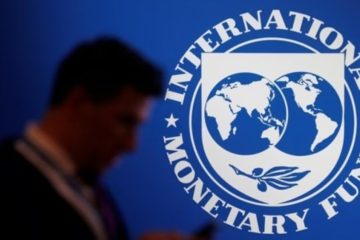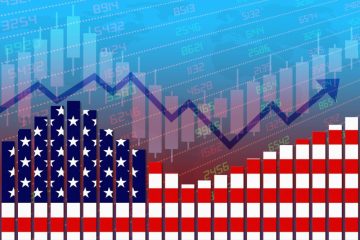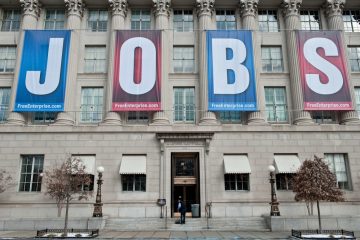The Trump tariff message is to make a deal, resist not.

The administration is attempting to preemptively mitigate adverse retaliatory actions, compelling major trading partners to evaluate the cost-benefit of engaging in conflict. Leaders from Canada, Europe, and China are signaling the potential for significant retaliatory actions against the United States in light of President Trump’s unexpectedly high tariffs imposed on a broad range of imports. The administration’s stance is unequivocal: any consideration of the matter is off the table.
Trump is attempting to disrupt the cyclical nature of the trade war by imposing significant new tariffs on any nation that retaliates, while also offering the possibility of a more favorable agreement for those who refrain from responding and engage in negotiations. The implementation of the highest tariffs, referred to as reciprocal duties for numerous nations experiencing goods-trade imbalances with the United States, is scheduled for Wednesday. This timeline affords global leaders the opportunity to advocate for their positions before a president who prides himself on his negotiation skills. “One of the key points I wish to convey this evening is for everyone to remain calm, take a moment to reflect, refrain from immediate retaliation, and observe how the situation unfolds,” Treasury Secretary Scott Bessent stated to CNN shortly after Trump’s tariff announcement on Wednesday. “Retaliation often leads to escalation.”
Currently, a significant portion of the global community remains optimistic regarding the prospect of an agreement. Anthony Albanese, the Prime Minister of Australia, which maintains a free-trade agreement with the U.S. but is currently confronted with 10% tariffs, stated that his government would refrain from engaging in a “race to the bottom” through retaliatory measures. Japan, facing a 24% tariff, has yet to disclose any immediate plans for retaliation. India, confronted with a 26% tariff as stipulated by Trump’s executive order, has signaled that it does not intend to respond with retaliatory measures. Both countries that have enacted retaliatory measures—China, now subject to tariffs as high as 70%, and Canada, transitioning from a no-tariff free-trade agreement to imposing 25% tariffs on numerous exports—have refrained from deploying their most formidable strategies.
In Canada, this situation arises partly due to Trump’s threat to impose a twofold increase in tariffs on the nation following Ontario’s provincial leader’s decision to levy a 25% tax on electricity exports to the United States. In a reciprocal escalation of trade tensions, Trump proposed imposing 200% tariffs on European alcoholic beverages, notably Champagne, following the European Union’s announcement of a 50% tariff on American whiskey in response to prior steel and aluminum tariffs. The European Union postponed the enforcement of the initial set of duties, which the bloc projected could ultimately affect American goods worth up to $28 billion, until mid-April in an effort to negotiate a settlement.
Currently, leaders from Europe and Canada find themselves in a precarious position, balancing the need to demonstrate resolve through countermeasures while simultaneously maintaining the possibility of dialogue with Trump. EU Trade Commissioner Maroš Šefčovič, set to engage in a video call with U.S. trade officials on Friday, expressed his commitment to working “round the clock” to secure an agreement with the Trump administration.
Countries that seek to retaliate face a complex dilemma. The United States maintains a trade deficit with Europe, China, and Canada, importing more goods from these regions than it exports. This imbalance has historically provoked discontent from Trump and constrains their capacity to engage in reciprocal tariff measures. They seek to refrain from imposing tariffs on essential goods that are not readily available from alternative trading partners.
According to Barry Appleton, co-director of New York Law School’s Center for International Law, nations that choose to retaliate against the U.S. may exacerbate their own economic challenges. “It resembles the act of placing one’s head within the jaws of a lion,” he remarked. “Refrain from that action.” Europe is establishing the foundation for an innovative strategy that may effectively challenge the United States in its most advantageous sector: services exports.
Focusing on major American technology firms like Alphabet and Meta Platforms, or implementing alternative strategies to limit U.S. services, is generally perceived as a measure of last resort for the bloc. Such actions could elicit a strong response from the Trump administration and potentially harm the EU’s standing as a proponent of open markets. The potential for increased costs for consumers and unintended repercussions for European firms cannot be overlooked. “At times, possessing a firearm is crucial, and there are occasions when it is equally vital to display it, regardless of whether it is actively employed,” stated Bernd Lange, the chair of the European Parliament’s trade committee.
French President Emmanuel Macron indicated that the European Union may invoke a recently established legal framework enabling the bloc to counteract any attempts by a nation to exert economic pressure against it. The legal framework for retaliation is extensive, encompassing measures such as limiting market access for service companies or restricting the enforcement of intellectual property rights. Macron urged industries to maintain cohesion and resolve, rather than pursuing isolated agreements or declaring investments in a bid to secure exemptions from Washington. “What implications arise from significant investments by major European players in the American economy, particularly in the context of ongoing tensions?” Macron stated. “It is essential to foster a sense of unity.”
Administration officials and allies of Trump have asserted that adopting such an aggressive stance towards him is fundamentally misguided. “I would not wish to be the final nation attempting to negotiate a trade agreement,” stated Eric Trump on X. “The initial party to engage in negotiations will secure an advantage—the final participant will inevitably face defeat.” This film has been a constant presence throughout my life. Administration officials have suggested that Trump remains steadfast on the fundamental aspects of his trade policies. Nearly all imports will now incur a minimum tariff of 10%, a threshold that officials have characterized as a baseline. However, there exists potential for negotiation concerning the elevated tariffs imposed on certain nations that maintain significant trade surpluses with the United States.
Commerce Secretary Howard Lutnick indicated that a reduction in tariffs on China would be contingent upon the cessation of exports of the components utilized in the production of fentanyl. “A simple phone call from President Xi to President Trump, indicating a commitment to halt fentanyl production that is adversely affecting American lives, could result in a 20% decrease,” he stated during an interview with Bloomberg Television.
In a decisive move, China demonstrated its assertiveness on Thursday. A statement from the Commerce Ministry indicated that the tariffs “contravene international trade regulations, significantly undermine the legitimate rights of the affected parties, and exemplify a quintessential act of unilateral coercion.” However, the ministry did not delineate the subsequent measures that are intended to be undertaken.
In Canada, Prime Minister Mark Carney has implemented new tariffs of 25% on various automobiles imported from the United States, as a countermeasure to the tariffs imposed by the U.S. on foreign-manufactured vehicles. He and Trump have committed to addressing trade disputes following Canada’s April 28 election; however, he conveyed skepticism regarding the likelihood of achieving a favorable agreement with Trump. “I wish to avoid creating unrealistic expectations,” Carney stated on Thursday. While the tariff policy is likely to adversely affect American households, it is my assessment that the administration will remain steadfast in its course until the repercussions become undeniably significant, he noted.
Gil Ecker
Gil Ecker is Charting & Technical Analyst. He has more than 10 years experience of Global Stock Markets.









